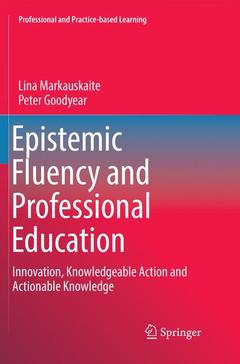Epistemic Fluency and Professional Education, Softcover reprint of the original 1st ed. 2017 Innovation, Knowledgeable Action and Actionable Knowledge Professional and Practice-based Learning Series, Vol. 14
Auteurs : Markauskaite Lina, Goodyear Peter

1 Introduction.- 2 Professional work in contemporary contexts.- 3 Defining the problem: four epistemic projects in professional work and education.- 4 The shapes taken by personal professional knowledge.- 5 Professional knowledge and knowing in shared epistemic spaces: the person-plus perspective.- 6 Understanding the mind.- 7 Epistemic thinking.- 8 Objects, things and artefacts in professional learning and doing.- 9 Epistemic tools and artefacts in epistemic practices and systems.- 10 Inscribing professional knowledge and knowing.- 11 Inscriptions shaping mind, meaning and action.- 12 Epistemic tools, instruments and infrastructure in professional knowledge work and learning.- 13 Taxonomies of epistemic tools and infrastructures.- 14 Professional epistemic games.- 15 Weaving ways of knowing.- 16 Rethinking the material, the embodied and the social for professional education.- 17 Conceptual resourcefulness and actionable concepts: concepts revisited.- 18 Epistemic resourcefulness for actionable knowing.- 19 Teaching and learning for epistemic fluency.- 20 Creating epistemic environments: learning, teaching and design.
Date de parution : 06-2018
Ouvrage de 636 p.
15.5x23.5 cm
Date de parution : 10-2016
Ouvrage de 636 p.
15.5x23.5 cm
